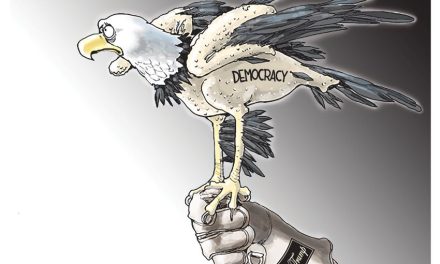We live in a political time when legal traditions are regularly ignored in pursuit of political agendas, and each time, our system of government is diminished by it.
That’s why we hope the Shelby County Board of Commissioners tread lightly in voting on an ordinance that would set regulations for businesses within Memphis, albeit the worst of Memphis’ businesses – its out of control strip clubs.
Although we sympathize with their intentions to do something to control the lawless strip club culture that’s legendary even in the word of mouth of the rough and tumble industry, the county board of commissioners should resist the temptation to abandon 30 years of legal discretion in their zeal to control the clubs.
It Takes Two
We’ve written several times before about the “anything goes” environments that shocked even the hardened adult-oriented business expert, Eric Kelly, who was brought in by the Office of Planning and Development to develop ways for local governments (emphasize plural) to eliminate the drug, prostitution and health hazards that are prevalent at the strip clubs.
There’s never any greater wake-up call for county commissioners than coming face-to-face with the political realities of their offices. After being elected on substantial campaign promises, they take their oaths of offices and learn quickly that their direct impact within the City of Memphis is limited on its best days and nonexistent on most. As a result, there’s never a deep understanding among city residents of what county commissioners do and how it affects them.
Reality Check
As a result, over the years, commissioners have always welcomed ways to amplify their roles. Unfortunately, ribbon-cuttings for the openings of new health clinics are few and far between, and with the county’s abandonment of the library system, they aren’t involved in those any more.
So, when commissioners are presented with the opportunity to extend their reach in a politically opportune area like strip clubs, it’s easy to appreciate how hard it is for them to resist the chance to pass an ordinance that would mandate business rules within Memphis.
While we question the ultimate legality of such an action, whether it’s legal or not, it’s just bad governance.
That’s Why They’re Cities
Memphians elect City Council members to set rules and regulations for the businesses within their city limits, and normally, this is done through joint actions in areas like zoning, construction codes and health codes. While it is a cumbersome and frustrating structure, it is the one set up by our state constitution.
Once citizens incorporate a city and its citizens elect their representatives, they then have the primary responsibility for determining – hopefully in response to the public’s needs – what rules should be established for businesses operating within that city, whether that city is Collierville or Memphis.
Even if there is a legal basis for arguing that Shelby County Government has the power to impose its will within Memphis, it should resist the Siren’s call of political expediency, because it flies in the face of legal advice to county officials for four decades.
That said, as for the board of commissioners, we feel their pain.
But Who’s Laughing
For years, enforcement over the strip clubs – vested largely with the Memphis Beer Board – has been a joke. On occasion after occasion, Beer Board members acted more like investors in the clubs than citizens protecting the quality of life in their city’s neighborhoods.
That’s why there’s the widespread opinion in the community that a cozy relationship exists between strip club owners and city elected officials. If a majority of City Council members are serious about ethics reform – and it’s increasingly looking like they’re not – they should start with stronger regulations for sexually-oriented businesses.
And if Memphis Mayor Willie W. Herenton is serious about running for reelection, he should once and for all show the kind of leadership that responds to the concerns of neighborhood leaders who have to deal with the fallout from these clubs.
Putting It On Record
At this point, rather than pass a questionable ordinance, we think the Shelby County Board of Commissioners should make sure this is a key issue in the upcoming city elections. They can do this by making City Council put up or shut up, and we think they do it by amending existing joint codes and put Memphis City Council members on the spot.
With passage by the county of a joint ordinance or amendment to a joint ordinance, the county commissioners force the Council members out into the open, especially those who behind the scenes protect strip club owners and take their money.
We are willing to bet that if the county commissioners take such action and send it across to City Hall, City Council Chairman Tom Marshall will happily add it to the agenda. And in this way, City Council members will have to take a public stand, and if they vote against it, we will finally know if the rumors about club owners owning council members are true.
Here’s our post from a year ago on these clubs:
Full Frontal Assault On SOB’s Is Called For If Change Is Going To Come
Yesterday, Memphis City Council and Shelby County Board of Commissioners had one of their infrequent joint meetings to discuss a bothersome issue for Memphis – the S-O-B’s.
The news they got was B-A-D.
In this case, we’re referring to S-O-B’s as in sexually-oriented businesses. The news from the consultants hired by the Office of Planning and Development was startling: Memphis is in the top three cities in the U.S. for “anything goes” in its sex clubs.
It’s not what the local legislators were expecting to hear, judging from the grim looks and incredulous comments. But then again, it’s been one of the worst-kept secrets in Memphis that strip clubs here are famous for their uninhibited, graphic behavior.
Over the years, there’s been periodic talk about regulating SOB’s, but it always fades away as suddenly as it begins. Normally, the public’s ire about this issue is raised when a business considers a suburban location. A double standard is seen when it comes to the rest of the city, and despite the talk, there’s been very little done to control the clubs on any level.
Three-time Loser
In that regard, Memphis is a three-time loser, failing in regulation, licensing and zoning. Put simply, it should really come as no surprise that things are completely out of control.
The nationally prominent consultants, after visiting Memphis’s sex clubs, said that Memphis is in the major leagues in public obscenity. Few cities rival ours, and the consultants’ recent work in Detroit showed that the city pales in comparison to Memphis.
In the clubs here, sex is ever present and ever available — any kind, any way, any cost.
If you want food, you go to the kitchen and order it from the cook, because the woman serving your table is delivering services, but it’s not food. There is “full body contact” between male customers and female dancers on stage, frequently moving to a back room to complete the exchange of cash and bodily fluids.
In other words, if you’re wondering what takes place in these clubs, let your imagination run wild. You’re probably not imaginative enough to compile the list of activities taking place there.
The problem is basic. There are no checks and balances and no serious consequences in the current regulatory system.
Beer Board
The Memphis Beer Board – the regulatory body over these clubs – repeatedly slaps club owners on the wrists, collects the fines that it needs for its operations and sends the club owner back to his business. To the club owner, the fine is just another routine cost of business.
Unlike some cities, in Memphis, there is no “three strikes and you’re out” regulation, but even if there were, it’s hard to see the Beer Board applying it.
Here’s the normal scenario: someone is arrested inside a club for drugs or prostitution, usually by one of the only seven vice officers with Memphis Police Department. Notification of the arrest goes to the beer board, which shows a lack of concern that is as much of its make-up as its politically appointed members.
The Beer Board is headed up by Reginald French, plugged-in political operative and Democratic candidate for Shelby County Sheriff. Past performance of the board certainly does nothing to polish his law and order credentials.
Lessons from other cities show that the ones that have been effective in handling the SOB’s rely on a combination of aggressive enforcement of criminal obscenity laws and the type of stringent regulations that the consultants have written for other locales.
National Consultants
Eric Kelly and Connie Cooper, the consultants advising city and county planners on a course of action to control these clubs, have national credentials, and their work has been instrumental in other cities successfully balancing First Amendment issues with the interest of a community to regular SOB’s.
In fact, they wrote the book on this problem. Literally. It’s titled “Everything You Always Wanted to Know About Regulating Sex Businesses,” and it was released by the American Planning Association.
They tends to reject the term “adult entertainment,” a marketing term invented by the pornography industry, in favor of sexually oriented businesses, because it provides a useful acronym for these enterprises, which pose public health and safety hazards.
They describe activities in Memphis clubs as coming close to legalized prostitution, and it is this aspect of the clubs’ operations that are most troublesome, because two clubs are owned by rival gangs whose dancers may be coerced into working there.
They acknowledge that municipalities can’t legally prohibit sexually oriented businesses from building within their borders, but they can regulate where they are built, such as in commercial or industrial areas and away from schools, parks, playgrounds and churches.
Themes
Although recommendations from Mr. Kelly and Ms. Cooper won’t be presented until next month, several themes have already emerged in meetings discussing what could be done to help with this problem in Memphis. One, regulatory oversight should be removed from the ineffectual Beer Board and given to a public agency prepared to enforce and punish; two, existing zoning ordinances need to be fine tuned to restrict the location of these clubs and their operations; and three, clubs should be required to get a license or permit.
Surprisingly, none of the clubs is required to get a permit to get into the sex business. The required permit is to sell beer and food only, although the dancers have to get a permit. To compound enforcement efforts, if codes enforcement officials cite the businesses into court for violations, the maximum fine that can be levied against them is $50, because the Tennessee Legislature has refused to allow higher fines for code infractions.
Meanwhile, there are primary three local owners of these SOB’s, and they interchange ownership frequently with quit claim deeds so that codes regulations can’t be enforced in any meaningful way. Every time property ownership is changed, the clock starts running all over again.
Change
In other words, there are plenty of changes that need to be made if Memphis is to get serious about these problems, but the ability of cities to have some control over these businesses has widened as a result of U.S. Supreme Court rulings over the past 20 years.
Lately, the Office of Planning and Development has been showing a more aggressive side in its leadership, bringing in nationally known experts to help with issues from tax freezes to Broad Street revitalization to a new development code to sexually-oriented businesses. But high-quality information means nothing if elected officials don’t act on it.
Mr. Kelly and Ms. Cooper have exposed the ugly underbelly of Memphis to the light, and hopefully, government officials will take strong action to control the illegal activities in these clubs. Not only is it needed to address public health and safety issues, it’s needed to eradicate the ugly whispers in the halls of government about influence exerted by these club owners.
In the end, that’s the most insidious problem of all.




